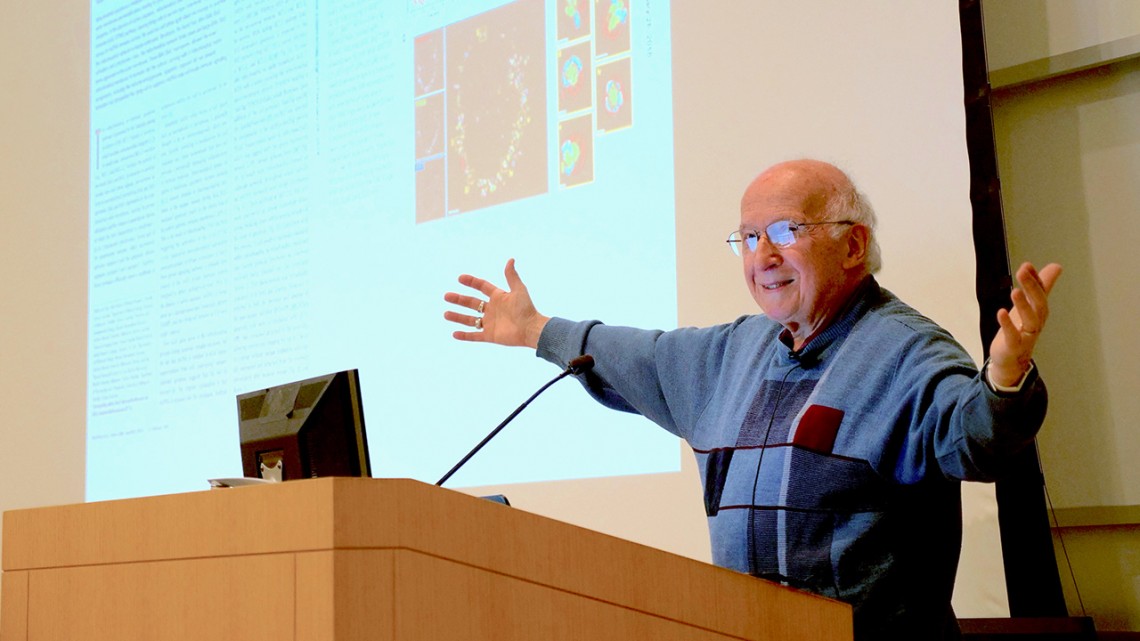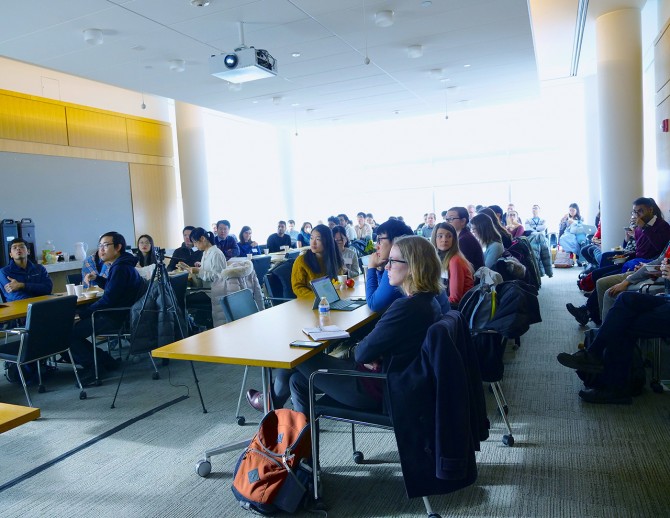
Nobel laureate Roald Hoffmann delivers the keynote lecture “Publishing Scientific Papers” at the workshop “Research From Start to Publish.”
How do you flourish in scientific publishing? Ask a librarian
By Jose Beduya
To jump-start the careers of graduate students and postdocs in the fields of engineering, math and the physical sciences, Cornell University Library held a free workshop, “Research From Start to Publish,” Jan. 7–8.
Librarians and guest faculty members led sessions on topics including intellectual property, presentation skills, data management, open-access publication, and databases and electronic resources. The wealth of library resources, in particular, was highlighted in a presentation titled “$2.5 Million-a-Year Worth of Information at Your Fingertips.”
Nobel Prize-winning chemist Roald Hoffmann delivered the keynote lecture, sharing personal anecdotes and practical advice about scientific publishing, including understanding the submissions process, dealing with different editors, following guidelines, and addressing reviewers’ comments and questions.
With humor, Hoffmann, the Frank H.T. Rhodes Professor of Humane Letters Emeritus, also underscored emotional factors influencing publishers.
“Beginning scientists idealistically think that the world out there is made up of logical people,” he said, noting that negative emotions like envy can sometimes surface in the review process. Despite any mean-spirited feedback, he stressed, “You must be professional and polite in your answers.”
After Hoffmann’s lecture, participants heard from a faculty panel of journal editors: Shane Henderson, director of the School of Operations Research and Information Engineering; Matt Miller, professor in the Sibley School of Mechanical and Aerospace Engineering; and Anil Nerode, the Goldwin Smith Professor of Mathematics. The panelists shared thoughts on topics such as avoiding common mistakes, improving conference presentations and increasing chances for publication.
“One of my takeaways is you don’t want your reader to go through the pain that you went through in your research,” said Andrew Daw, a fifth-year Ph.D. student in the field of operations research and information engineering. “You want to look at the final product and tell a story, and that story shouldn’t necessarily be in chronological order.”
Part of a series of immersive library workshops, “Research From Start to Publish” was organized by the Cornell Library’s science and technology libraries, and it drew 50 participants from 14 departments, including applied and engineering physics, materials science and chemistry.
“I think the workshop was fantastic,” said Pamela Graney, a postdoctoral researcher in biomedical engineering. “The two-day workshop was really useful, and I like having the time to really go through each section in detail and not try to shove it all in a 90-minute section.”
Yikun Zhao, a visiting researcher in biological and environmental engineering, hopes to apply what she learned from the workshop to her teaching and research at South China Agricultural University. “It was a very precious experience,” she said.
Jose Beduya is a staff writer, editor and social media coordinator for Cornell University Library.
Media Contact
Get Cornell news delivered right to your inbox.
Subscribe

